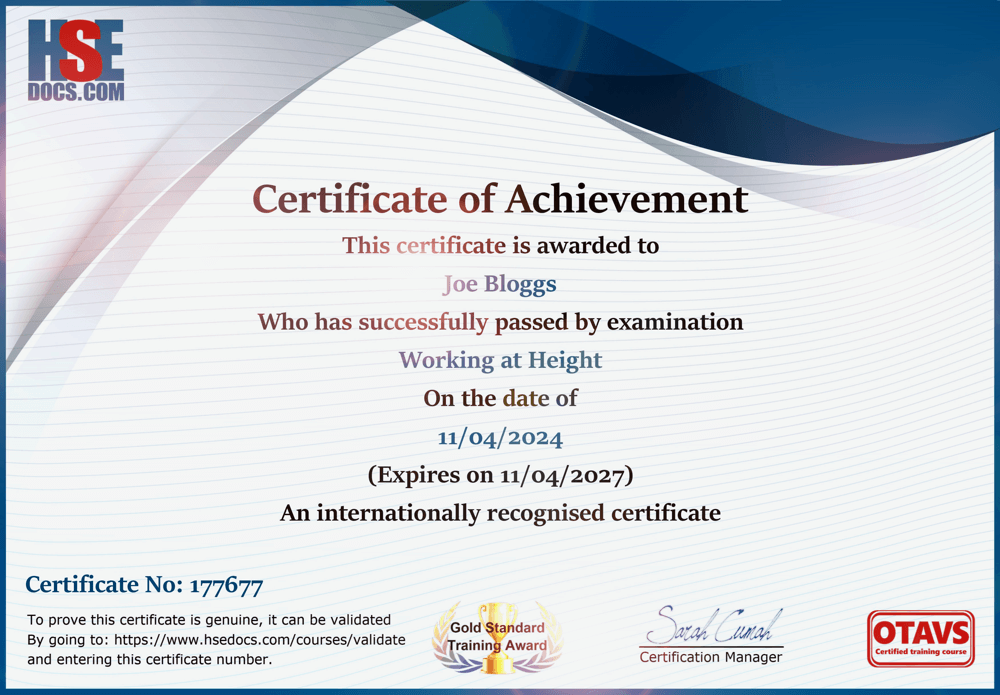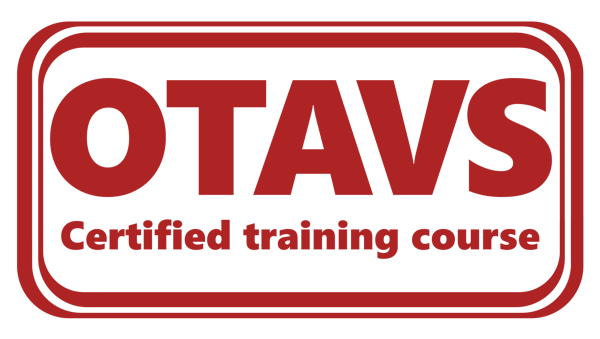Online Level 3 Food Hygiene Course from
AKA Food Safety Level 3
Course certificate valid for 3 years
Internationally accredited training
Online Safety training by HSEDocs.
Covering UK and Scottish law.
70% Discount Special Offer
£9.99 for an individual course, £6.49 if you buy 10 or more, and just £4.99 for bulk orders of 50 or over.
This course is accredited and certified by OTAVS.
Online Training Accreditation & Verification Service
We are often asked how we can provide our Level 3 Hygiene course at such a low price. The answer is that our high sales volume allows us to keep prices low. Typically, for every Level 3 course sold, our customers purchase ten Level 2 Hygiene Courses. This high sales volume enables us to offer you the best possible prices.
Take advantage of our great prices today.
Course duration: Between 2 ½ and 3 ½ hrs depending on learning speed.
Course format: Four video training modules, with a multiple-choice section at the end of each module.
Entry Requirements: Anyone can complete this course, whether they have previous experience or not.
This training course is highly recommended for individuals in roles involving kitchen management, supervision, or ownership of kitchen facilities. It teaches individuals the knowledge and skills to maintain strict safety and hygiene standards for themselves and others they supervise within a kitchen environment. After completing the course, participants will be able to effectively identify potential hazards and implement appropriate control measures to reduce the risk of contamination.
levels of Hygiene Courses are as follows:
Level 1 Hygiene certification is designed for individuals who handle pre-packaged foodstuffs. This includes, but is not limited to, waiting staff in restaurants, employees at food banks, and shopkeepers.
Level 2 Hygiene certification is essential for individuals involved in preparation within a variety of settings, including cafes, chip shops, restaurants, mobile catering units, hotel kitchens, hospital kitchens, school kitchens, college kitchens, outdoor cooking events, and similar environments.
Level 3 Food Hygiene certification is designed for kitchen managers, supervisors, and anyone overseeing kitchen staff. This certification is essential for leadership roles within the food service industry, as it covers advanced safety principles, risk management, and maintaining a hygienic environment.
Upon completing your online food hygiene course, you will receive a certificate valid for three years. Local Authorities and Environmental Health Officers widely recognise this certificate, which can help you improve your hygiene rating.
All successful candidates are entered on the national training register and certificates can be verified by employers or others to prove that they are genuine, by clicking Validate a Certificate and typing in the certificate number.
Overview of the Level 3 Food Hygiene Course
The learning topics covered in this course include:
- Personal and workspace hygiene.
- Risk assessment and control measures.
- Temperature control and its importance.
- Cross-contamination risks.
- Food hazards and how to avoid them.
- HACCP
- Kitchen Management laws
Personal and workspace hygiene are essential in maintaining safety standards. Hygiene in both personal and workspace environments involves regular handwashing, proper sanitation of preparation areas, clean utensils, equipment, and work wear. Upholding high hygiene standards can help prevent foodborne illnesses and ensure the safety of the food we prepare and consume.
Kitchen risk assessments provide detailed information and involve identifying, evaluating, and managing potential risks within a food environment. Once a risk has been identified, control measures are implemented to mitigate the risk.
The significance and relevance of temperature control whn storage and cooking is a precise science that requires careful attention. Overlooking its importance can pose serious risks, so it is crucial to strictly adhere to recommended guidelines to ensure safety.
Cross-contamination is a significant risk factor for food poisoning, as it increases the likelihood of harmful bacteria spreading between food items. This can occur through direct contact or contact with contaminated surfaces, utensils, or hands. In this section, we will explore various ways cross-contamination can occur and provide information on how to prevent it in food preparation and storage.
The final section of the document focuses on implementing a Hazard Analysis and Critical Control Points (HACCP) and kitchen management systems. This involves the systematic identification, evaluation, and control of hazards at critical points in the food production process. The HACCP system records, monitors, and minimises potential risks to ensure the end product's safety.
Our Level 3 Food Hygiene certificate is recognised by local authority Environmental Health Officers and counts towards your Hygiene Rating, which you can find out more about in our blog - ‘Your Guide To Food Hygiene Ratings.’

Level 3 Food Hygiene Training is specifically designed for individuals who manage or supervise safety in various workplaces, including sectors such as catering, manufacturing, hospitality, and retail. This training targets those responsible for overseeing handling processes, developing and implementing safety policies, and training staff to uphold high hygiene standards. It also presents an excellent opportunity for anyone aiming to transition into managerial or supervisory roles where adherence to safety regulations is crucial.
If you find yourself managing or supervising staff in the retail or hospitality industries, Level 3 training showcases your commitment and understanding of handling techniques, the importance of proper preparation environments, and how to organise and document scheduled safety tasks.
This course offers comprehensive instruction designed for those in supervisory roles within kitchen settings, such as kitchen managers and supervisors. Participants gain extensive knowledge that highlights essential hygiene practices.
Supervisors and managers in food-related fields comprise the primary audience for this training, as these roles necessitate oversight of food-handling teams and strict adherence to established procedures. Individuals in these positions require not only practical knowledge of hygiene practices but also the ability to identify potential risks and take corrective action when necessary.
In summary, this training is tailored to equip professionals who manage or supervise safety within their workplaces. It also focuses on implementing planned hygiene requirements, fulfilling employers' and employees' legal training requirements. This Level 3 Food Safety certificate is widely recognized as the standard for supervisors and kitchen managers in the food industry, validating the commitment and expertise of individuals in kitchen management roles. This certification will positively impact your company's Food Safety Environment (FSE) rating.Whether you are a supervisor, manager, or business owner, this programme provides the essential knowledge and skills to uphold and enhance your establishment’s food hygiene standards.
The amount of food safety training you need will be based on various factors, primarily your job responsibilities and daily duties. This is in line with EC Regulation 852, which specifies that your food safety training should match your job role. To help you determine the level of food safety training required in a work setting, we've created a useful guide.
| Food Hygiene Level Guide | |
|---|---|
| Front of House & Wait Staff | Level 1 |
| Porter & Assistants | Level 1 |
| Line Cooks | Level 2 |
| Kitchen Managers & Supervisors | Level 3 |
Understanding Different Food Hygiene Certificates
Food hygiene certificates are credentials that ensure individuals' and organisations' training levels comply with current safety standards. Level 1 certificates are typically aimed at frontline staff, such as servers and food handlers. Level 2 targets chefs, cooks, and others who prepare or reheat food, while Level 3 covers the supervisory roles and safety systems required in a kitchen environment. Specialised certificates are also available tailored to specific sectors, such as food manufacturing or retail. These programmes address the unique challenges associated with large-scale food production, storage, and sales. Additionally, some certifications focus on particular food types, such as meat, seafood, or dairy, providing education that meets the distinct handling and processing needs of these products.
Level 1 Safety Certificate: This provides training for individuals involved in direct food handling and is ideal for kitchen assistants, waitstaff, and other frontline employees in environments such as restaurants, cafes, and catering services.
Level 2 Safety Certificate: This covers everything a chef needs to know about safety, from vermin control to correct cooking and reheating temperatures.
Level 3 Safety Certificate: This is intended for individuals in supervisory roles who require a deeper understanding of food safety practices. Training at this level includes guidance on implementing food safety systems, managing allergens, and complying with legal food safety requirements.
Sector-Specific Food Hygiene Certificates: These qualifications focus on the distinct requirements of particular industries or food products. For instance, food manufacturing certification may emphasise large-scale production safety protocols, while retail-focused certificates might highlight proper food display and storage for sales environments. Specialised certifications for handling specific products, such as meat, seafood, or dairy, provide targeted training on the unique challenges and safety standards associated with these items.
Allergen Awareness Certificate: This is designed for staff working in environments where allergens pose a concern. It covers the identification of common allergens, preventing cross-contact, and understanding the importance of clear labelling and communication. This certification is often required in bakeries, restaurants, and catering businesses that prepare food for individuals with specific dietary restrictions.
HACCP Certification: This qualification focuses exclusively on the principles of hazard analysis and critical control points. It is typically required for roles that involve creating, implementing, or maintaining HACCP systems, such as quality assurance personnel, food production managers, and regulatory compliance officers. It is particularly pertinent in food manufacturing, processing plants, and high-risk environments where strict monitoring and controls are essential.

Contact Our Food Health & Safety Experts
We are always happy to help here at HSEDocs, so if you have any questions or concerns about the online Food Hygiene course or any other HSEDocs online training queries, please give us a quick call.

 CART
CART 














